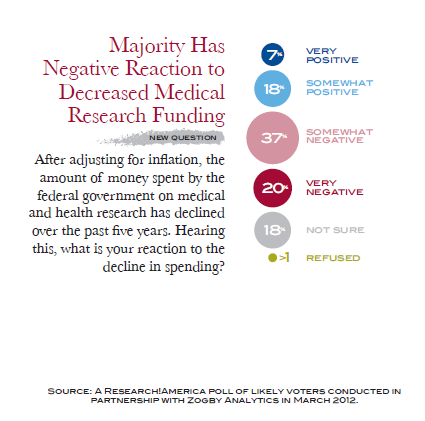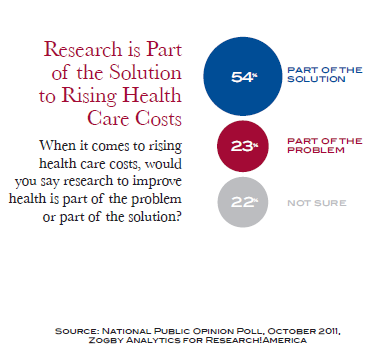Fiscal Cliff Part II: What can scientists do to protect the future of basic science research?
By Christina Pyrgaki, @CPyrgaki
In Fiscal Cliff Part I, I talked about how the fiscal cliff will affect science and what citizens should do about it. Part II is for scientists: how can we protect the future of scientific research?
Researchers are trained to write for scientific journals or funding agencies, but they are not necessarily trained – or inclined – to write for broad audiences. Many scientists shy away from advocating science to lay audiences, either because it is too hard or because there is no incentive. Now, with the fiscal cliff looming, scientists need to re-examine this notion.

In a recent survey Research!America reported that a whopping 72% of Americans believe that Congress and President Obama should take action to expand medical research within the first 100 days of the new Congress. While this number is very encouraging, we should note that 20% of people were “Not Sure” about important science and medical funding topics. This needs to be rectified!

Here, answering “Not Sure” means one of two things: either people do not have the necessary information to answer the question or they do not consider the question important enough to think about. In either case, sciences loses. The 9-20% of citizens who were “Not Sure” are likely to sit idle when funds for scientific research are slashed by equally “Not Sure” politicians.
Scientists often assume that the applications of science to health are obvious, but they may not be so obvious to the general public… Only 32% of the population strongly supports the idea that basic research is necessary, and 23% of the population thinks that research is part of the problem as opposed to the solution to rising health care costs. It is up to researchers to explain what scientific research actually offers to society, in both the short term and the long term.
How can scientists do this?
Researchers should make an effort to explain science to anyone and everyone around them: family, friends, or elected officials. The scientist who passionately works on an obscure scientific question, secluded and disconnected from society, is an endangered species in these economic times.
The harsh funding environment is selecting for a new hybrid species: the scientist-communicator. This does not mean that each scientist needs become a full-time, professional science communicator. After all, scientists are fairly busy doing… well… science! It is, however, essential for every scientist to learn how to share their research and its impact on society without jargon, and with the same enthusiasm that arises when they speak with colleagues and collaborators.
Only an informed society can influence elected officials to support research. This in turn will allow scientists to keep asking the right questions, and finding the right answers. In this day and age, brilliant ideas and tireless hours at the bench alone won’t cut it. Scientists need to assume new roles and adapt to the ever-changing environment. Our society cannot afford to forfeit those who strive to examine, explain, and improve the world… we must survive because the world needs us.
What’s coming up next on Science, Inc?
While all scientists need to share their enthusiasm and hope for the best, they also need to prepare for the worst. As part of this preparation they have to fight for federal funding but also find other sources of financial support. We’ll discuss ways to develop both people and money skills, and adapt to the new reality of tight budgets and limited resources.
These views are the work of individual authors, do not necessarily represent the views and opinions of The Rockefeller University, and are not approved or endorsed by The Rockefeller University.
